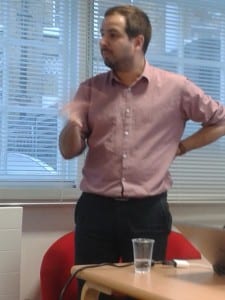Professional Registration: Reflecting on the PSKB and the path to Chartership
By uczccin, on 17 March 2016
This week (Monday March Feb 14th 2016) we had a visit from CILIP Development Officer, Matthew Wheeler, who spoke to us about chartership. This report was written by MA LIS student Becky Scott:
Studying for a Masters in Library and Information Studies is just the beginning of professional lifelong learning. The next step for many graduates will be professional registration at the Chartership level. According to CILIP Development Officer Matthew Wheeler, professional qualifications are linked to higher pay, so we all have a vested interest. But the benefits do not stop there. Networking with a mentor can help candidates explore the wider professional context and return with good practice to improve their own service.
The process requires the transfer of the skills and knowledge we have developed at UCL into the workplace. For those of us currently employed in the profession, we have started this already. For example, in the Autumn term I studied Advanced Information Literacy. Since January I have been implementing a scheme of guided inquiry in our school library based on my self-directed learning. The next step is to write a case study reflecting on the process and evaluate how effective the intervention has been. This process of learning, implementing and evaluating is at the centre of the professional registration. The assessors are looking for reflective practice.
Five tips I took from the talk:
- Revisit the PSKB now. Evaluate your skills and knowledge using the spreadsheet in five areas that you would like to develop.
- Find a mentor in a different sector to your own. When you contact them, use the personal touch. Tell them why you would like them as your mentor. Include your CV in the email.
- Reflect on each learning opportunity you have. Record your thoughts. Record any changes you make as a result.
- When constructing your portfolio, ask yourself: Why is this relevant? What did I learn from this? Where has it taken the organisation?
- Learning opportunities are more than formal CPD. The assessors are looking for a range of evidence – Twitter, blog post, webinar, a conversation with a peer – to show you are a twenty-first century professional
Author: Becky Scott, 17 Mar 2016
Matthew’s slides (PDF) can be downloaded here: Matthew Wheeler chartership slides, UCL 14th March 2016
 Close
Close


